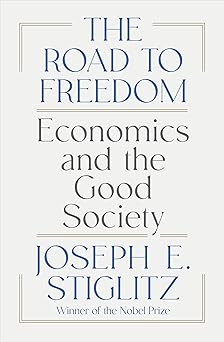
As the world is grappling with the consequences of economic inequality and the erosion of social freedoms, we find ourselves in a precarious state. We were born from the conviction that people must be free, but over the years, this idea has been co-opted. The forces of the political Right have hijacked the notion of freedom, using it to justify exploitation and dismantle any semblance of regulation. This has led to a situation where pharmaceutical companies overcharge for medication, big tech is left unchecked, politicians incite rebellion, corporations pollute, and wages for most people have stagnated. The financial crisis, the opioid crisis, and the crisis of inequality have become an unfortunate reality. The failures of our current economic system are a stark reminder that the pursuit of freedom has come at the cost of social responsibility.
The economic advisor to presidents and the chief economist at the World Bank, Joseph E. Stiglitz, dissects the American economic system and the ideology that created it. He shines a light on the twinned failures of "free" and unfettered markets, which have delivered a series of crises. Stiglitz argues that the failures follow from the elites' unwavering dedication to "the neoliberal experiment." He explicitly takes on giants like Friedrich Hayek and Milton Friedman, exposing their twisted visions that tear at the social fabric while enriching the few. As he delves deeper, Stiglitz shows that the accepted ideas about political and economic life are fundamentally flawed. He explains that our current systems have become a mere facade, where the freedoms of the few are prioritized over the well-being and opportunities of the many.
In "The Road to Freedom," Stiglitz breaks new ground by reframing how we think about freedom and the role of the state in a twenty-first century society. Drawing on the work of contemporary philosophers, he presents a deeper, more humane way to assess freedoms – one that considers the conflicts between individual freedoms and the well-being of others. Stiglitz explains how we must reimagine our existing economic and legal systems, embracing collective action, regulation, and investment to create an innovative society where everyone can flourish. The task is urgent, and Stiglitz's latest book is essential reading for those committed to creating an economic and political system that delivers well-being, opportunity, and meaningful freedoms for all. As we navigate the complexities of our economic landscape, Stiglitz's warnings and insights serve as a timely reminder of the need for a more nuanced understanding of freedom and its true cost.
This book is a powerful and thought-provoking analysis of our economic system and its impact on society. As I delved into the pages, I couldn't help but think of the countless conversations I've had with friends and family members who are struggling to make ends meet, who are worried about the future of our country, and who feel like they're losing the fight for a fair and just society. The author's personal experience as an economist and advisor to presidents gives this book a sense of authority and depth that is hard to find in many other works of non-fiction.
The author's critique of the neoliberal ideology and its proponents, such as Friedrich Hayek and Milton Friedman, is scathing and well-researched. He reveals the devastating consequences of a system that prioritizes profits over people and freedom over collective well-being. From the opioid crisis to the financial crisis, the author shows how the failures of our current economic system have led to a situation where the few reap the benefits while the many suffer. What struck me most, though, was the author's call to action – his urgent reminder that we must reimagine our economic and legal systems to create a more humane and equitable society.
I was particularly moved by the author's discussion of what it means to truly live free. He argues that our current understanding of freedom is fundamentally flawed, and that it often comes at the cost of social responsibility and collective well-being. As someone who has seen firsthand the impact of economic inequality on individuals and communities, I couldn't agree more. This book is a vital contribution to the ongoing conversation about how we can create a more just and equitable society. It's a call to action that resonates deeply, and one that I believe we must all heed if we want to build a better future for ourselves and for our children.
Rating: 5.0 / 5.0
The author, Joseph E. Stiglitz, dissects the American economic system and its ideology, revealing its failures and devastating consequences. He argues that the neoliberal experiment has prioritized profits over people and freedom over collective well-being, leading to crises like the opioid and financial crises. Stiglitz critiques the work of giants like Friedrich Hayek and Milton Friedman, exposing their twisted visions that tear at the social fabric. He presents a more humane way to assess freedoms, considering conflicts between individual freedoms and the well-being of others. Stiglitz calls for collective action, regulation, and investment to create an innovative society where everyone can flourish. This book is a powerful analysis, shedding light on the need for a more nuanced understanding of freedom and its true cost.